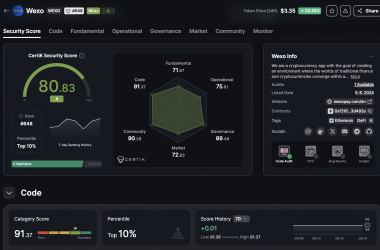Smart contracts: Ethereum and competitors
DAO DAY TRADING DECENTRALIZATION ERC-20 ETHEREUM (ETH) MINING PoS (Proof-of-Stake) SMART CONTRACT TOKEN03-Jan-2022

TOP-Beiträge

Prestigious auditor ranked WEXO among TOP10% of projects
The listing on a centralized exchange, together with the excellent audit result and the 8th place among payment pro...
Mehr lesen
Wexo Points: Find places where you can pay with Bitcoin (App Up...
Search nearby businesses that accept Bitcoin payments
Mehr lesen
Wexo Meetup Košice on 27 April (invitation)
Saturday full of news and innovations this time in the metropolis of the east!
Mehr lesenIn a recent article on our blog, we discussed the operation and basic functionality of smart contracts in a blockchain network. But while smart contracts are becoming a tool for revolutionary change in many industries, check out interesting blockchains and their differences.
First was Ethereum
Smart contracts were especially popularized by Ethereum. Capabilities of the second largest blockchain have led to a number of decentralized DApps applications and NFT tokens with numerous usage examples.
Ethereum's blockchain network was created for this purpose. Unlike most blockchain networks, which are described as a distributed ledger, Ethereum is considered a distributed state machine.
Ethereum's network is currently very congested, requiring high transaction fees. Imperfect compatibility with other blockchains is also a problem. New platforms are seeking to address these shortcomings.
New projects with big potential
The Cardano network wants to compete with the conventional payment system, and as a platform is used for fast micropayments with low fees. Cardano is mined using the Proof of Stake method, which is more energy-efficient than Proof of Work.
The domain of the NEO blockchain platform should be easy to use. In addition to the cryptocurrency with the same name NEO, for example, the GAS token also operates on its network. NEO is also driven by the more economical Proof of Stake technology.
Stellar has a public blockchain and, unlike Ethereum, no specific language is used to encrypt smart contracts.
Polkadot (DOT) resolves the connection of individual blockchains, the developers of which plan to connect oracles, identities, IoT, and DeFi. The interesting thing about Polkadot is that it performs transactions in its parachain, i.e. outside the blockchain.
Solana (SOL) is currently the fastest cryptocurrency on the block, with a speed of 50,000 transactions per second. Just for comparison, Ethereum handles 15 - 45 transactions per second. In the case of Solana, the transaction fee is only a few fractions of a cent. Solana currently has about 400 projects running on its ecosystem. One of the most well-known is the USDC stablecoin.
Like other smart contract blockchains, Alogorand promises better speed, security, and scalability. An MiT professor is behind this project. He wants smart contracts to be more accessible, which is why several programming languages are available to developers in Alogorand.
Investing in smart contract platforms
Cryptocurrencies supporting smart contracts and investing in them is an exciting area. It's not just about the digital currency as such. There is a good chance that such a blockchain platform will not only survive in the long term, but its value is also likely to increase with the number of projects.
The Wexo cryptocurrency app contains the best cryptocurrencies that support smart contracts. Support for more such cryptocurrencies in the Wexo cryptocurrency wallet will soon be expanded to include other key projects in this area.
